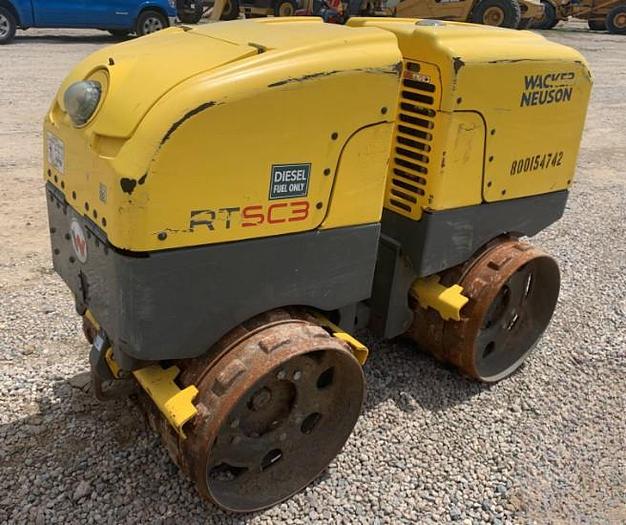
Construction workers and contractors often find themselves in a literal trench, yet the process of perfect soil compaction is not as simple as it may seem. Trench compaction is a critical step in a range of projects, from laying utilities to preparing the ground for building foundations. The role of compactors in this process is invaluable, ensuring that soil is firmly packed to provide stable support for above-ground structures and prevent the dreaded collapse or uneven settlement.
If you're ready to take on your next trench compaction project with Power Drive Supply by your side and are considering purchasing a trench compactor, you're in the right place. We'll guide you through what trench compaction is, discuss your options for trench compaction equipment, and highlight crucial factors to consider before making this significant investment.
What Is Trench Compaction?
Before we dig into the equipment, it's crucial to understand the practice of trench compaction. Trench compaction refers to the process of compacting the soil in a trench to the required density, typically using specialized compaction equipment. This process not only prepares the soil for the structural loads it will bear but also helps to prevent erosion and water seepage, which is crucial for the longevity of construction work.
Trench compaction can be achieved through various compaction methods, such as ramming, vibrating, and rolling, depending on the soil type, depth of the trench, and project-specific requirements. Each method has its advantages, with vibrating compactors being particularly effective when dealing with cohesive or granular soil types in deep trenches.
Trench Compaction Equipment Options
When it comes to selecting the right compactor for your trench compaction, you're spoiled for choice. There are several types of compactors tailored to different project needs. Here's a brief overview of the most common trench compaction equipment options.
Plate Compactors
These handheld or mounted compactors are versatile and suitable for smaller-scale tamping needs. Their ease of operation and maneuverability make them ideal for backyard projects or when working in tight spaces–though they’re typically not the model of choice for contractors or construction professionals.
Trench Rollers
Trench rollers, sometimes ride-on, offer superior compaction in undisturbed soil with their heavy drums. They are particularly favored when trenches are too narrow for other types of vibratory compaction equipment. This happens to be a preferred method for many construction professionals–which is why we offer a few high-quality used models, including a 2017 Wacker RTSC3 trench compactor, at Power Drive Supply. Check our specs here and see if this model is right for bolstering your career!
Rammer Compactors
Rammer compactors, also known as “jumping jacks,” are a type of impact compactor. They're used for compacting cohesive soils or when dealing with areas where vibration is prohibited or difficult, such as around utilities. These can be quite hard on the body and are typically not preferred for larger, more open projects.
Vibratory Plate Compactors
These compactors are similar to standard plate compactors but are equipped with a vibratory system. This allows for greater soil penetration and compaction efficiency, making them suitable for a wide range of soil types, including mixed soils and gravel.
Factors to Consider When Looking for a Trench Compactor
Selecting the right trench compactor is essential to the success of your project. Here are the factors you should take into account to ensure you make an informed decision.
Size and Scale of the Project
Consider the size and depth of the trenches you'll be working with. Compact equipment that's too large may be challenging to maneuver in tight spaces, while equipment that's too small might not offer the power needed for effective compaction. The scale of your project will also influence whether you should opt for handheld, walk-behind, or ride-on compaction equipment.
Power of the Equipment
The required power of your trench compactor will depend on the type of soil you're working with, the length and width of the trench, and its depth. Harder soils or deeper trenches will require more powerful compactors to achieve the desired compaction.
Manual or Automated
Decide whether you need a manual or automated compactor based on the volume of trenches to be compacted and the skill level of the operators. While manual compactors are economical and straightforward, automated options offer greater efficiency and are preferable for large-scale projects.
Used Trench Compactor for Sale with Power Drive Supply
.jpg)
One of the best ways to save on equipment costs is to buy used. Power Drive Supply has a few used trench compactors for sale that are in good working condition and have been meticulously maintained. With a selection of different brands and models, you're likely to find a machine that perfectly fits your project's needs.
Purchasing a used trench compactor from Power Drive Supply ensures you get reliable equipment at a fraction of the cost of a new one. Plus, our experts can provide invaluable assistance in choosing the right compactor for your project, giving you the knowledge needed to tackle your trench compaction with efficiency and ease.
The key to successful trench compaction lies in the details. From understanding the method to selecting the right equipment based on job requirements, taking the time to consider these factors can save you time, money, and headaches down the line. Whether you're a seasoned professional or new to the construction industry, with the right trench compactor at your side, you can ensure the soil beneath your feet is as solid as your next project's foundation. Contact us today to solidify your business expansion–we even offer used equipment financing!
